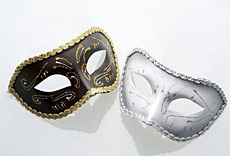Mystery. It's not much in favor these days. Modern consciousness has little respect for the unseen and the unknown. We're much more comfortable with sound bytes from the experts and tidy philosophical or psychological systems that have an explanation for every situation. Television programs us to think that every problem has a solution that can be found in an hour or two, minus the time for commercials.
Politicians, educators, scientists, writers, self-help psychologists, and even many preachers seem to have everything all figured out. If we need answers, they're more than willing to give them.
There is another way to be in our world: we can embrace mystery. Christian novelist and essayist Madeleine L'Engle said, "There are no answers to the wonder of creation." There is only a deep and abiding respect for the awesomeness and unfathomability of the miracles of life. To try to explain them in detail, to reduce them to a simple answer for someone, is to limit their majesty.
So how can you make acceptance of mystery a spiritual practice? The first step is to honestly admit that the Holy One does not fit our explanations or play by our rules. In today's lingo, God is — and always has been — out of the box.
Secondly, cherish the baffling, hidden, and inscrutable dimensions of your life. Give up on the idea that you can always "get it." We are not in charge here, and we don't have to put all the pieces together. There will be many times in your life when you will not have an answer to a question. Why do bad things happen to good people? Why do good things happen to bad people?
Practice mystery by responding to such conundrums by simply answering "I don't know." By taking this honest approach, you acknowledge the limitations of the human mind, the fallibility of reasons, and the humbleness in your heart in the presence of God. At the same time, the "I don't know" approach enables you to follow the mystery wherever it leads you.
Sometimes God draws near, and at other times God withdraws. Like Job in the Hebrew Bible, we can only stand in a confusing whirl of answers and simply let God be God. This is not an easy stance, nor a popular one. Job's well-meaning friends have plenty of contemporary counterparts.
Another way to be a steward of the mysteries of God is to practice wonder. Artists are good tutors. The job of the artist, Frances Bacon wrote, is to deepen the mystery. Look at a painting by Vincent Van Gogh of a sunflower or a pair of shoes. He made even the most familiar objects seem to have an extra dimension to them. He made them mysterious.
Poets often remind us of things which cannot quite be put in words. The haiku poet Issa wrote: "The world of dew / is only the world of dew / and yet." It is the "and yet" that adds immeasurably to our appreciation of this image. The "and yet" is the talisman of mystery.
We can learn about mystery from our relationships, too. Who has not wondered at the mystery of love, fidelity, and even estrangement? We think we understand love, and yet there is always something about it we can't explain. That's the mystery of it.
During our prayer and meditation periods each day we like to use breath prayers. These are short prayers you repeat quietly, saying one line as you take a breath in, and another as you breathe out. Here is one of our favorites, suggested by Joyce Rupp in her devotional book The Cup of Our Life, which will help you develop an appreciation for mystery:
Breathing in: "O Mystery . . .
Breathing out: "alive in me."
The mystery is all around us and touches us in the deepest parts of ourselves. Be a good steward of it.
